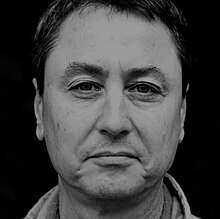Peter Suber
| Peter Suber | |
|---|---|

Peter Suber in Brooksville, Maine, November 2009
|
|
| Born |
November 8, 1951 Evanston, Illinois |
| Fields |
Open access Philosophy Ethics Logic |
| Institutions |
Northwestern University Earlham College Harvard University Scholarly Publishing and Academic Resources Coalition Berkman Klein Center for Internet & Society Open Knowledge Foundation Public Knowledge |
| Alma mater | Northwestern University |
| Thesis | Kierkegaard's Concept of Irony especially in relation to Freedom, Personality and Dialectic (1978) |
| Doctoral advisor | William A. Earle |
| Known for |
Nomic Open access Budapest Open Access Initiative |
| Notable awards | Lyman Ray Patterson Copyright Award (2011) |
| Spouse | Liffey Thorpe |
|
Website www cyber |
|
Peter Dain Suber (born November 8, 1951) is a philosopher specializing in the philosophy of law and open access to knowledge. He is a Senior Researcher at the Berkman Klein Center for Internet & Society, Director of the Harvard Office for Scholarly Communication, and Director of the Harvard Open Access Project (HOAP). Suber is known as a leading voice in the open access movement, and as the creator of the game Nomic.
Suber graduated from Earlham College in 1973, received a PhD degree in philosophy in 1978, writing a dissertation on Søren Kierkegaard and a Juris Doctor degree in 1982, both from Northwestern University.
Previously, Suber was senior research professor of philosophy at Earlham College, the open access project director at Public Knowledge, a senior researcher at Scholarly Publishing and Academic Resources Coalition (SPARC),. He is a member of the Board of Enabling Open Scholarship, the Advisory Boards at the , the Open Knowledge Foundation, and the advisory boards of other organizations devoted to open access and an information commons.
Suber worked as a stand-up comic from 1976 to 1981, including an appearance on The Tonight Show Starring Johnny Carson in 1976. Suber returned to Earlham College as a professor from 1982 to 2003 where he taught classes on philosophy, law, logic, and Kant's Critique of Pure Reason, among other topics.
...
Wikipedia
